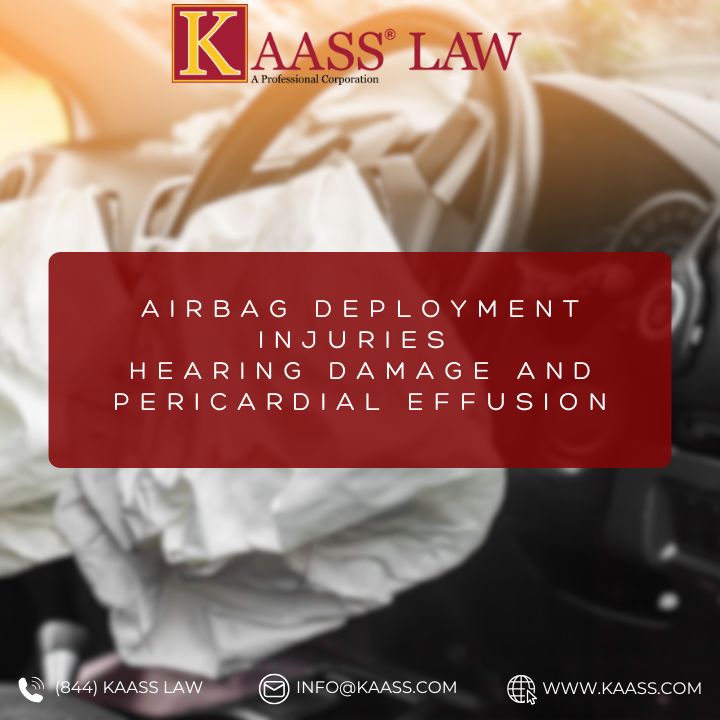The Hidden Risks of Airbag Deployment
One of the most crucial safety features in contemporary cars is the airbag. In order to shield drivers and passengers from direct contact, they deploy in milliseconds during a collision. Although airbags have prevented thousands of deaths, they can potentially seriously injure people due to the quick explosion that causes them to inflate.
Two dangers that are frequently disregarded include pericardial effusion, a serious condition where fluid accumulates around the heart following chest trauma, and hearing impairment brought on by the high decibel level of deployment. Although these injuries might not be immediately apparent, they may have long-term effects.
Hearing Damage from High Decibel Levels
Airbag deployment is powered by a chemical reaction that creates a rapid burst of nitrogen gas. This expansion inflates the airbag in less than 30 milliseconds. The reaction also creates an explosive sound that can reach levels of 170 to 178 decibels, according to research from the National Institutes of Health.
To put that into perspective, everyday conversation is about 60 decibels, a loud concert is about 120 decibels, and a gunshot at close range is about 140 decibels. Experts consider 140 decibels the threshold of pain. Noise beyond this level can cause immediate and permanent hearing loss. Airbag noise far exceeds that.
Common Types of Hearing Injuries
Victims of airbag deployment may experience:
- Tinnitus: Ringing or buzzing in the ears that may be temporary or permanent.
- Hearing loss: This can be a temporary threshold shift that improves over time, or permanent hearing damage caused by destroyed inner ear hair cells.
- Eardrum perforation: A rupture of the tympanic membrane that can lead to pain, bleeding, and chronic hearing problems.
- Balance problems: The inner ear helps control balance, so damage may also cause dizziness and vertigo.
The closed environment of a car cabin makes this risk worse because sound waves cannot escape and instead bounce around inside the vehicle. Drivers and passengers in the front seat are the most vulnerable because they are closest to the airbag modules.
While airbags prevent many catastrophic injuries, the potential for permanent hearing loss is significant and should not be ignored.
Pericardial Effusion from Airbag Impact
Airbag injuries are not limited to the ears. The chest is also exposed to tremendous force when an airbag deploys. This blunt trauma can result in pericardial effusion, which is the buildup of excess fluid in the sac surrounding the heart. The pericardium normally contains a small amount of fluid to lubricate the heart as it beats. When trauma damages the heart or nearby blood vessels, additional fluid or blood can leak into the sac. If too much fluid builds up, it can compress the heart and limit its ability to pump blood. This is called cardiac tamponade, a life-threatening medical emergency.
Pericardial effusion may not be obvious immediately. Many victims think chest pain after a crash is only bruising, but the condition can worsen quickly. Symptoms to look out for include:
- Chest pain or pressure
- Shortness of breath
- Fatigue or weakness
- Dizziness or fainting
- Low blood pressure
Because these symptoms overlap with other accident injuries, proper testing, such as echocardiograms or CT scans, is necessary to confirm the diagnosis. Prompt treatment is critical to prevent serious complications.
Just as hearing damage can be an invisible but lasting consequence of deployment, pericardial effusion shows how airbags can cause hidden injuries inside the body.
Legal Considerations for Airbag Injuries
Airbags are meant to protect lives, but they can also create new medical problems. If hearing loss or pericardial effusion occurs because of airbag design flaws, excessive deployment force, or other defects, manufacturers may be held liable. Improper installation or faulty sensors can also be factors in some cases.
Victims should keep detailed medical records after an accident. Hearing tests can document damage to the ears, while cardiac imaging can confirm pericardial effusion. These records are important for proving that the injuries were caused by airbag deployment.
Legal claims may allow victims to recover compensation for:
- Medical bills and rehabilitation costs
- Lost wages or reduced earning ability
- Pain and suffering
- Long-term care needs
How KAASS LAW Can Help
At KAASS LAW, we understand the serious impact of airbag-related injuries. Hearing loss from extreme noise exposure and pericardial effusion caused by chest trauma are conditions that can permanently affect quality of life. Our attorneys work closely with medical experts to investigate how these injuries occurred and to hold the responsible parties accountable.
We fight for compensation that covers medical expenses, lost income, and the pain you and your family have endured. Our goal is to guide you through the legal process with skill and determination. Contact us for guidance and support with your case. Call KAASS LAW, leave it to us!

